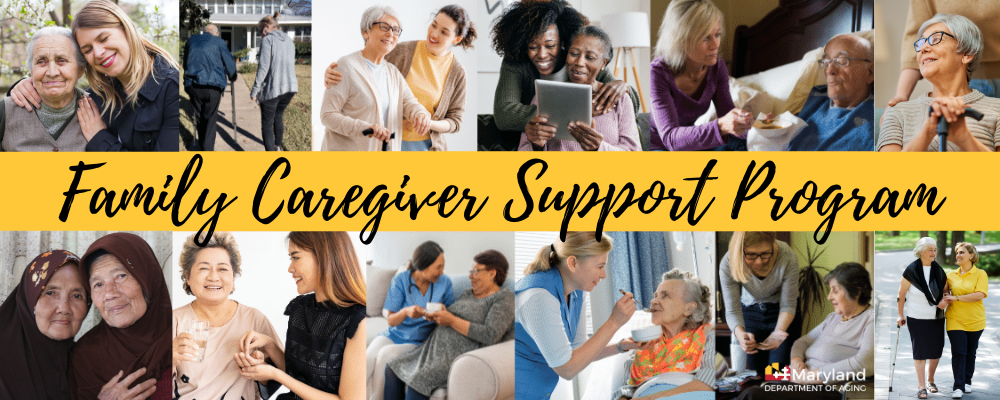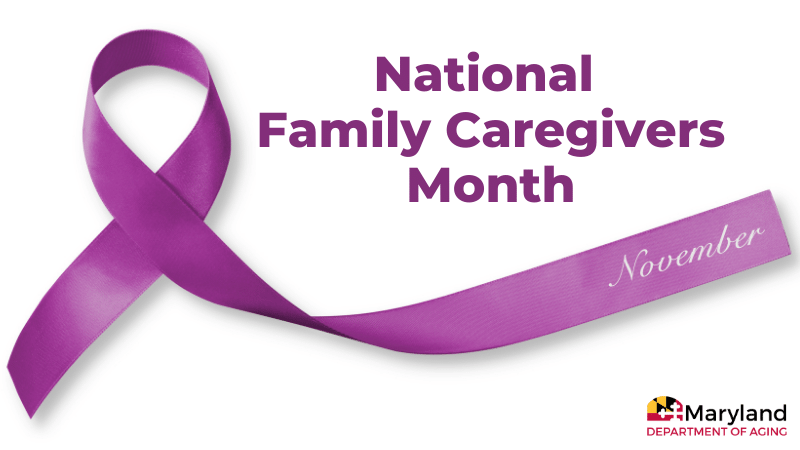How to Become a Paid Caregiver for a Family Member in Maryland
Family Caregiver Support Program
Main_Content

Family Caregiver Support Program Overview
The Maryland Family Caregiver Support Program is administered past the Maryland Department of Crumbling and is function of a national network of caregiver programs funded by the federal Administration for Customs Living. The program helps family and informal caregivers care for their loved ones at domicile for equally long as possible. Family unit caregivers are the major source of unpaid assist for older and disabled adults living in communities across the land. These caregivers typically include spouses, adult children, relatives, and friends.
Available Services
Maryland's Family Caregiver Back up Program works in conjunction with a host of State and community-based services to create a coordinated array of supports for individuals who demand them. Studies evidence that these services can reduce caregiver low, anxiety, and stress and enable them to provide intendance longer, thereby avoiding or delaying the need for costly institutional care.
The program offers v types of Caregiver Services:
Data
Information and Assist
A service that provides the individuals with current information on o pportunities and services bachelor to the individuals within their communities.
Assistance with accessing services
Data Services
- A public and media action that conveys information to caregivers nigh available services, including in-person interactive presentations, booth/exhibits, or radio, TV, or Web site events.
- This service is non tailored to the needs of the individual.
Counseling, pedagogy and the establishment of support groups
Counseling
- A service designed to support caregivers and aid them in decision- making and problem solving.
- Provided past a qualified advisor
- Includes counseling to individuals or grouping sessions
Case Direction
- A service provided to a caregiver, at the direction of the caregiver by an individual who is trained or experienced in the case management skills that are required to deliver services and coordination.
Training
- A service that provides caregivers with educational activity to improve noesis and functioning of specific skills relating to caregiving.
- Skills may include activities related to health, nutrition, and fiscal management; providing personal care; and communicating with health care providers and other family unit members.
Support Groups
- A service led by an individual who meets state/territory policy requirements to facilitate caregiver discussion of their experiences and concerns and develop a mutual support system.
- For the purposes of Title Iii-Eastward funding, caregiver back up groups would non include "caregiver education groups," "peer-to-peer support groups," or other groups primarily which teach skills or see without a qualified facilitator.
Respite
Respite
A service which offers temporary, substitute supports or living arrangements for care recipients. Information technology provides a brief menses of relief or residual for caregivers.
Supplemental Services
Supplemental services on a express footing
- Appurtenances and services provided on a limited footing to complement the care provided by caregivers.
- A category of service that describes the state-defined service, which does non fall into the previously defined service categories.
Service Domains
- Assistive Technology/Durable Equipment/Emergency Response
- Consumable Supplies
- Home Modifications/Repairs
- Legal and/or Financial Consultation
- Homemaker/Chore/Personal Care
- Transportation
- Nutrition Services
- Other
The family caregivers who are eligible to receive services include:
- Adult family unit members or other breezy caregivers historic period 18 and older providing care to individuals 60 years of age and older;
- Adult family members or other informal caregivers age eighteen and older providing care to individuals of any historic period with Alzheimer's affliction and related disorders;
- Grandparents and other relatives (non parents) 55 years of historic period and older providing intendance to children under the age of 18; and
- Grandparents and other relatives (not parents) 55 years of age and older providing care to adults historic period xviii-59 with disabilities.
Caregivers of Older Adults and Older Relative Caregivers Defined:
Caregivers of Older Adults and Older Relative Caregivers
- An adult family fellow member, or some other individual
- Informal provider of in-abode and community care
- Older individual
- Private with Alzheimer's disease or a related disorder
Older Relative Caregivers
- Caregiver who is age 55 or older
- Provides support to a child nether eighteen and is non a parent
- Provides support to an adult ages 18-59 with disability (may exist a parent)
Boosted Resources
- Caregivers "Effectually the Clock" Infographic PDF
- Caregiver Consummate Care Plan Form - this course is shared past the CDC and is completed for the person receiving intendance to track family members information. A intendance programme summarizes a person's health conditions and current treatments for their intendance.
- Grandparents Resource Directory
- Alzheimer's Association
- Family Caregiver Alliance
- Generations United
- Home Alone Study Brief
- Information technology All Falls on Me Report
- National Hospice and Palliative Care Assn. — Find a Hospice
- Partners in the Arts
- The Well Spouse Foundation
- Good for you Aging in a Pandemic Earth: What Older Adults and Caregivers Need to Know Now
National Family Caregivers Month
November is National Family Caregivers Month. As stated past the Caregiving Action Network, "Caregiving tin can be a 24-hours a day/vii-days a calendar week chore. Caring for a senior with Alzheimer's or a child with special needs can be non-stop. Providing care around the clock can crowd out other of import areas of life. And you never know when y'all will need to rush to the infirmary or leave piece of work at the drop of a hat. Caregivers truly provide around the clock support for their care recipients.

Center_Content
Source: https://aging.maryland.gov/Pages/National-Family-Caregiver-Support.aspx
0 Response to "How to Become a Paid Caregiver for a Family Member in Maryland"
Mag-post ng isang Komento